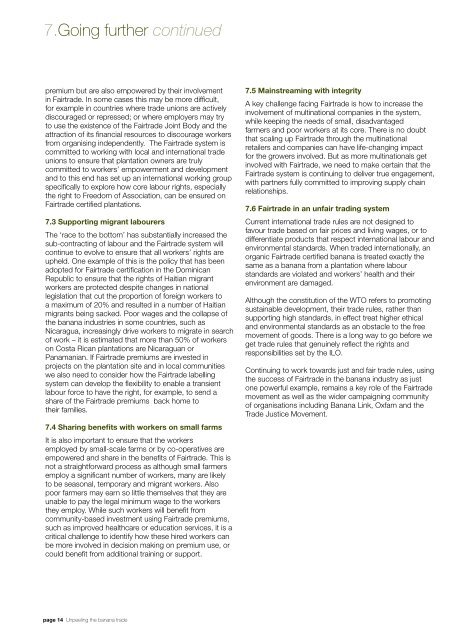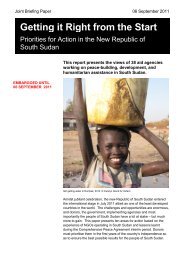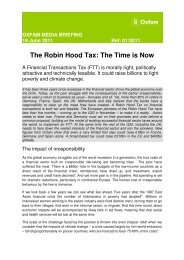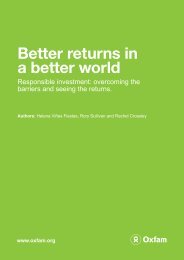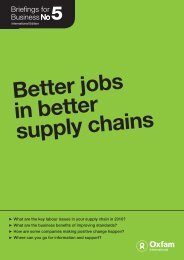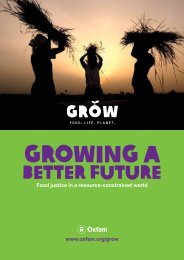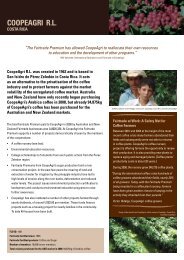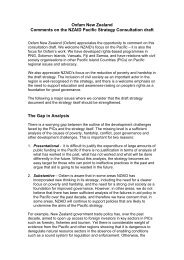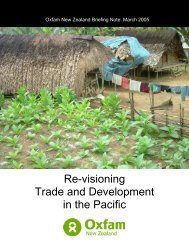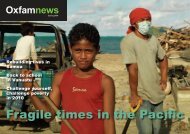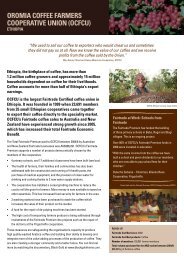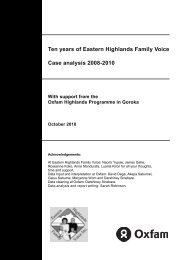Bananas: Unpeeling the Banana Trade - The Fairtrade Foundation
Bananas: Unpeeling the Banana Trade - The Fairtrade Foundation
Bananas: Unpeeling the Banana Trade - The Fairtrade Foundation
Create successful ePaper yourself
Turn your PDF publications into a flip-book with our unique Google optimized e-Paper software.
7.Going fur<strong>the</strong>r continuedpremium but are also empowered by <strong>the</strong>ir involvementin <strong>Fairtrade</strong>. In some cases this may be more difficult,for example in countries where trade unions are activelydiscouraged or repressed; or where employers may tryto use <strong>the</strong> existence of <strong>the</strong> <strong>Fairtrade</strong> Joint Body and <strong>the</strong>attraction of its financial resources to discourage workersfrom organising independently. <strong>The</strong> <strong>Fairtrade</strong> system iscommitted to working with local and international tradeunions to ensure that plantation owners are trulycommitted to workers’ empowerment and developmentand to this end has set up an international working groupspecifically to explore how core labour rights, especially<strong>the</strong> right to Freedom of Association, can be ensured on<strong>Fairtrade</strong> certified plantations.7.3 Supporting migrant labourers<strong>The</strong> ‘race to <strong>the</strong> bottom’ has substantially increased <strong>the</strong>sub-contracting of labour and <strong>the</strong> <strong>Fairtrade</strong> system willcontinue to evolve to ensure that all workers’ rights areupheld. One example of this is <strong>the</strong> policy that has beenadopted for <strong>Fairtrade</strong> certification in <strong>the</strong> DominicanRepublic to ensure that <strong>the</strong> rights of Haitian migrantworkers are protected despite changes in nationallegislation that cut <strong>the</strong> proportion of foreign workers toa maximum of 20% and resulted in a number of Haitianmigrants being sacked. Poor wages and <strong>the</strong> collapse of<strong>the</strong> banana industries in some countries, such asNicaragua, increasingly drive workers to migrate in searchof work – it is estimated that more than 50% of workerson Costa Rican plantations are Nicaraguan orPanamanian. If <strong>Fairtrade</strong> premiums are invested inprojects on <strong>the</strong> plantation site and in local communitieswe also need to consider how <strong>the</strong> <strong>Fairtrade</strong> labellingsystem can develop <strong>the</strong> flexibility to enable a transientlabour force to have <strong>the</strong> right, for example, to send ashare of <strong>the</strong> <strong>Fairtrade</strong> premiums back home to<strong>the</strong>ir families.7.4 Sharing benefits with workers on small farmsIt is also important to ensure that <strong>the</strong> workersemployed by small-scale farms or by co-operatives areempowered and share in <strong>the</strong> benefits of <strong>Fairtrade</strong>. This isnot a straightforward process as although small farmersemploy a significant number of workers, many are likelyto be seasonal, temporary and migrant workers. Alsopoor farmers may earn so little <strong>the</strong>mselves that <strong>the</strong>y areunable to pay <strong>the</strong> legal minimum wage to <strong>the</strong> workers<strong>the</strong>y employ. While such workers will benefit fromcommunity-based investment using <strong>Fairtrade</strong> premiums,such as improved healthcare or education services, it is acritical challenge to identify how <strong>the</strong>se hired workers canbe more involved in decision making on premium use, orcould benefit from additional training or support.7.5 Mainstreaming with integrityA key challenge facing <strong>Fairtrade</strong> is how to increase <strong>the</strong>involvement of multinational companies in <strong>the</strong> system,while keeping <strong>the</strong> needs of small, disadvantagedfarmers and poor workers at its core. <strong>The</strong>re is no doubtthat scaling up <strong>Fairtrade</strong> through <strong>the</strong> multinationalretailers and companies can have life-changing impactfor <strong>the</strong> growers involved. But as more multinationals getinvolved with <strong>Fairtrade</strong>, we need to make certain that <strong>the</strong><strong>Fairtrade</strong> system is continuing to deliver true engagement,with partners fully committed to improving supply chainrelationships.7.6 <strong>Fairtrade</strong> in an unfair trading systemCurrent international trade rules are not designed tofavour trade based on fair prices and living wages, or todifferentiate products that respect international labour andenvironmental standards. When traded internationally, anorganic <strong>Fairtrade</strong> certified banana is treated exactly <strong>the</strong>same as a banana from a plantation where labourstandards are violated and workers’ health and <strong>the</strong>irenvironment are damaged.Although <strong>the</strong> constitution of <strong>the</strong> WTO refers to promotingsustainable development, <strong>the</strong>ir trade rules, ra<strong>the</strong>r thansupporting high standards, in effect treat higher ethicaland environmental standards as an obstacle to <strong>the</strong> freemovement of goods. <strong>The</strong>re is a long way to go before weget trade rules that genuinely reflect <strong>the</strong> rights andresponsibilities set by <strong>the</strong> ILO.Continuing to work towards just and fair trade rules, using<strong>the</strong> success of <strong>Fairtrade</strong> in <strong>the</strong> banana industry as justone powerful example, remains a key role of <strong>the</strong> <strong>Fairtrade</strong>movement as well as <strong>the</strong> wider campaigning communityof organisations including <strong>Banana</strong> Link, Oxfam and <strong>the</strong><strong>Trade</strong> Justice Movement.page 14 <strong>Unpeeling</strong> <strong>the</strong> banana trade


